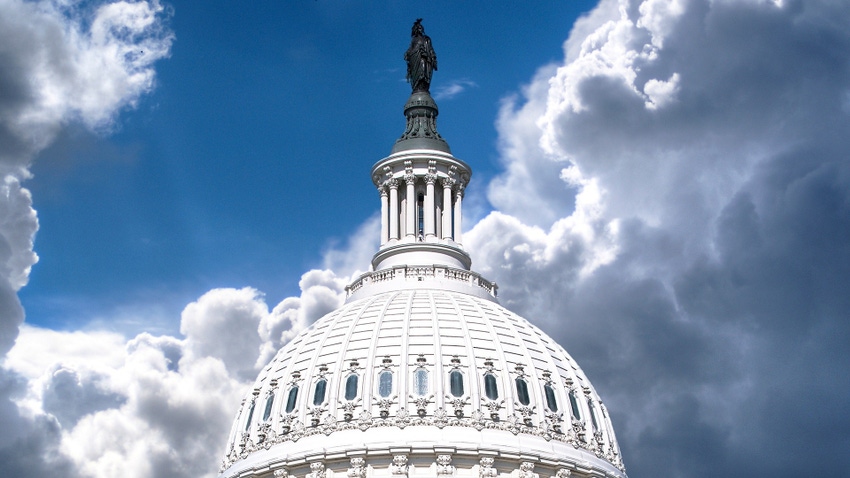Biden signs $1.9T COVID-relief package
Legislative Watch: USDA’s plan to protect meat inspectors investigated; Investigation of ocean carriers needed; Michael Regan confirmed EPA administrator.

President Joe Biden signed the $1.9 trillion COVID-relief package, “American Rescue Plan,” that provides $1,400 in stimulus checks for individuals earning $75,000 and $1,400 per person for couples earning $150,000. Weekly unemployment benefits will be extended through Sep. 6 at $300.
The bill provides additional support for small businesses; funding for vaccines, testing, and contact tracing; and additional support for education. It provides additional support for state and local governments in which funds can be used for water, sewer, and broadband, in addition to covering pandemic-related costs and revenue shortfalls.
The legislation contains $22.7 billion in agriculture and nutrition assistance with a majority of the funding increase for nutrition programs. It addresses the “long standing and widespread discrimination against socially disadvantaged farmers and ranchers” regarding USDA’s farm loan programs by providing debt relief and assistance for Black farmers and other minority farmers. Additional funding is provided for protective equipment investments for farm and food workers; assists small meat and poultry processers with overtime inspection costs; and expands USDA’s surveillance of COVID-19 and animals.
The legislation does not increase the minimum wage to $15, which was in the House legislation.
IG investigating USDA’s plan to protect meat inspectors
USDA’s Office of Inspector General (OIG) is launching an investigation into how USDA responded to the spread of COVID-19 in meat facilities last year.
The investigation is in response to Senator Michael Bennet’s, D-Colo., August 2020 request the OIG review the steps the federal government took to prevent the spread of COVID-19 in meat processing plants and what impact President Trump’s use of the “Defense Production Act” to keep plants open may have affected workers.
Bennet in his request said, “Meat processing plants have had some of the highest rates of COVID-19 infections, harming a workforce predominately comprised of immigrants, refugees, and People of Color who are at a higher risk for COVID-19…While many industries suffered from COVID-19 outbreaks, the high incidence of outbreaks at these facilities, even very early in the pandemic, raises questions.”
USDA’s Inspector General Phyllis Fong in a letter informed Bennet an audit would begin to:
Determine what actions USDA’s Food Inspection Service (FSIS) took to ensure the health and safety of FSIS inspectors;
Determine if adequate personal protective equipment, sanitizers, soap and water, and dividers were provided for inspectors.
Review actions taken by USDA following Trump’s Executive Order that invoked the “Defense Production Act.”
Review how FSIS spend the $33 million it was given in the CARES Act.
Investigation of ocean carriers needed
Companies are facing major problems in being able to ship products out of the West Coast ports, with reports that carriers are declining to ship U.S. agricultural exports. They are calling on the administration to assist in rectifying this issue.
The Agriculture Transportation Coalition (AgTC) in a letter to President Biden said that ocean carriers are enjoying their most profitable period in decades by controlling capacity, charging unprecedented freight rates, and refusing to carry some U.S. agricultural exports. The letter signed by nearly 70 agricultural organizations called on Biden to use the Shipping Act and other available tools to curtail the ongoing crisis. The Shipping Act gives the Federal Maritime Commission (FMC) the authority to prohibit unreasonable, unjust practices.
Those signing the letter included the Agriculture Transportation Coalition, American Farm Bureau Federation, American Feed Industry Association, American Seed Trade Association, National Council of Farmer Cooperatives, National Pork Producers Council, North American Meat Institute and U.S. Meat Export Federation.
A bipartisan group of 111 House members also sent a letter to Michael Khouri, chairman of the FMC, stating their concerns with reports of ocean carriers declining to ship U.S. agricultural exports from U.S. ports. They asked the commission to expedite its findings and consider enforcement options.
A similar letter was sent by 24 Senators.
The FMC in March 2020 launched Fact Finding No. 29, “International Ocean Transportation Supply Chain Engagement,” to investigate congestion, bottlenecks, and fees in U.S. ports. In November the FMC expanded the Fact Finding No. 29 to include reports of ocean carriers declining to ship American exports.
Michael Regan confirmed EPA administrator
The Senate on a bipartisan vote confirmed Michael Regan as the 15th EPA administrator. Regan was the secretary of North Carolina’s Department of Environmental Quality and previously worked at EPA during the Clinton and Bush administrations.
Over 20 agricultural organizations sent a letter in January supporting Regan’s nomination, stating he “has an established record of listening to all stakeholders, including farmers and ranchers.”
Those signing the letter included the American Farm Bureau Federation, American Soybean Association, National Corn Growers Association, National Cotton Council, National Farmers Union, National Pork Producers Council, National Turkey Federation, North American Meat Institute and The Fertilizer Institute.
White House ag adviser
Kelliann Blazek has been named special assistant to the President for agriculture and rural policy. Most recently, Blazek had been director of Wisconsin’s Office of Rural Prosperity. Previously, she worked for Representative Chellie Pingree D-Maine, taught at George Mason University’s law school, and worked at the National Sustainable Agricultural Coalition.
Source: P. Scott Shearer, who is solely responsible for the information provided, and wholly owns the information. Informa Business Media and all its subsidiaries are not responsible for any of the content contained in this information asset.
About the Author(s)
You May Also Like



